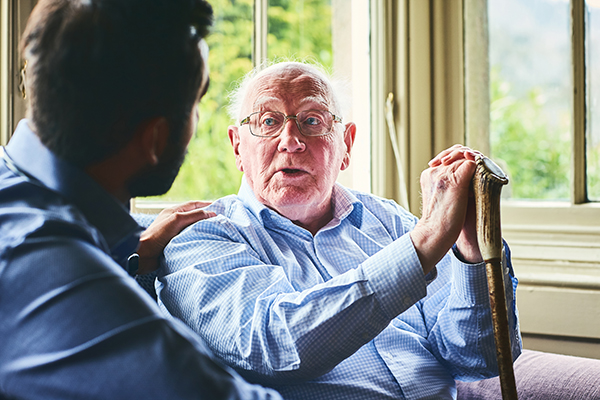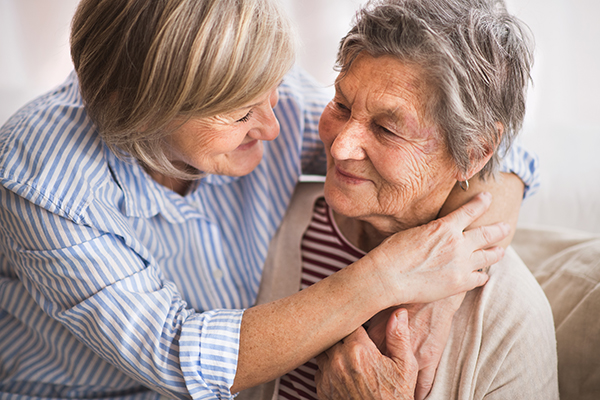Respite Care
Senior Finances: Help Prepare for Future Needs Now
Get a grip on senior finances and plan for future needs today with these tips.
The good news is we’re now living longer than ever before, with upwards of one in three older adults living until age 90 and beyond. The bad news, however, is that retirement planning for today’s seniors often didn’t take into consideration such longevity, leading to a strain on senior finances in later years.
So, what happens if your parents outlive their financial resources? As part of the sandwich generation, making their own retirement plans while still covering expenses for your own children, you may find yourself in need of supporting your aging parents as well. As a matter of fact, a recent survey by AgeUp shows that:
Nearly three out of four participants believe that at least one of their parents will live longer … Read More »
Take These Steps to Prevent Financial Elder Abuse
Protect the seniors you love from financial elder abuse with these tips.
When asked whether they thought they might be at risk for financial elder abuse or fraud, the overwhelming majority of surveyed older adults – 81%, in fact – were confident that they would never fall for a scam. We all want to believe we’re too savvy and smart to be taken advantage of; but the reality is, many scammers are even smarter and savvier.
And though we might assume that financial fraud mostly occurs at the hands of strangers, the truth is that as many as two out of three of all financial crimes are committed by people the victim knows and trusts.
The good news is, there are several steps that seniors and their loved ones can take to protect themselves:
Register with EverSafe (or a … Read More »
Caregivers, Watch Your Back! Prevent Caregiver Injuries with These Tips
Senior couple in kitchen paying bills, looking frustrated
Even though the ultimate goal is always to improve safety and health for seniors they love, family caregivers, regrettably, frequently end up diminishing their very own in the process. In fact, an astonishing 94% of caregivers in a study carried out by Ohio State University revealed musculoskeletal pain in a minimum of one part of their body – and 66% noted this pain influencing their quality of life.
And know that a “family caregiver” can describe anyone in the family who helps another individual with day to day activities. As reported by the Family Caregiver Alliance, this suggests 34 million Americans are at risk of becoming hurt through the care they provide.
At Hired Hands Homecare, we know firsthand the amount of lifting, bending, and weight-bearing necessary in satisfying the … Read More »
7 Ways to Ease Hygiene Care for Someone with Alzheimer’s
Make hygiene care for someone with Alzheimer’s more comfortable with these tips.
Of the numerous challenges related to caregiving, the Alzheimer’s Association indicates that the most prevalent challenge is hygiene care for someone with Alzheimer’s, for various reasons:
Decreased sense of vision and smell
Comfort found in familiarity (i.e., desiring to wear exactly the same clothes repeatedly)
The challenges of bathing, compounded by cognitive impairment and confusion
Fear of falling, the noises and feelings associated with the water, and more
Cajoling, arguing, and logical thinking are hardly ever practical strategies with those impacted by Alzheimer’s or another form of dementia. Rather, attempt these innovative techniques if your loved one resists hygiene care:
Arrange the bathroom in advance so that the room will likely be comfortable and you will not have to juggle collecting supplies along with assisting your senior loved one. Warm the … Read More »
Caregiving Tips to Ensure You’re Motivating Without Bullying
Make sure you’re not crossing the line from motivating to bullying with these caregiving tips.
As a family caregiver, you obviously encounter an array of feelings throughout the day: shared laughter over a joke with your senior loved one; worry due to a health concern; and certainly, from time to time, irritation. We want only the best for those we love, and if a senior loved one is resistant to doing an activity we realize is beneficial, it could be tough to identify the most appropriate response.
The key is to try to offer motivation and support, while remaining cautious not to ever cross the line into bullying your senior loved one. These caregiving tips are good to remember:
There’s no one-size-fits-all. An approach that has worked on a single occasion may perhaps be entirely ineffective in another. In … Read More »
One Simple Way to Replace Caregiver Stress with Joy
Rediscover joy and watch caregiver stress melt away with this one simple tip.
Our facial expressions divulge so much to those around us, and when you’re feeling an unusual level of caregiver stress, well-meaning family members will certainly recognize it, possibly encouraging you to essentially, “Cheer up, buttercup!” In reality, of course, it takes a whole lot more than a couple of words to turn our mood around.
Nonetheless, recent research does support the concept of positive thinking as a method to minimize levels of depression and anxiety which might develop when we’re bombarded with stress – something critical for busy family caregivers to take to heart to decrease the possibility for burnout.
Judith Moskowitz, head psychologist in the research project who consequently established a program to combat the downward spiral of emotions so typical in individuals providing … Read More »
5 Tips to Effectively Manage Paranoia in Seniors
Paranoia in seniors with dementia can be challenging, but these tips can help.
“I’m telling you, there’s a dog in my closet! I hear it growling all night long. We’ve got to track down its owner!”
Listening to a senior loved one express concerns like this that you know to be untrue is distressing – however, not unheard of. Your first instinct may well be to try and rationalize with the person with a response such as, “Nonsense! There is no way a dog could have gotten into the closet!” However, for various reasons, this could be the least effective technique to handle unreasonable thoughts and paranoia in seniors.
Instead, we at Hired Hands Homecare propose the following tactics which will help bring back a sense of calm and wellbeing:
First, schedule an appointment with the senior’s physician. It … Read More »
Are You Torn Between a Career and Caregiving?
Many family caregivers are faced with the difficult decision to choose between a career and caregiving responsibilities.
Not long ago, actor Rob Lowe brought caregiving into the spotlight by sharing his story of caring for his mother and the toll it took on his own life. He said, “When you’re caring for a loved one, there’s nothing you won’t do to give them as much comfort and peace of mind as you can possibly provide. Often that means you’ll skip your social obligations, wreck your diet, suffer sleep deprivation, and even risk your career.” So, does that mean you need to choose between a career and caregiving for an older loved one?
Obviously, this topic is not anything new to the 75% of the United States workforce who are concurrently providing care for a parent at home. Based … Read More »
Caring for Someone with Dementia? Here’s What You Need to Know.
Caring for someone with dementia is easier with help from our experts in elderly care in Pleasanton and nearby areas.
At times, the best lessons in life come through going through them firsthand; yet the wisdom we are able to glean from those who have walked an identical path before us is priceless. If you’re caring for someone with dementia and feeling a bit stressed in this uncharted territory, the guidelines below will help:
What to Do When You Notice Warning Signs of Aging Care Needs
Learn how to start the conversation when you notice warning signs of aging care needs.
The initial signs might be so subtle that many people wouldn’t even recognize that anything is amiss. Mom is outgoing, pleasant, and conversational while visiting loved ones and while running errands. But those closest to her have begun to detect concerns: being forgetful about the soup cooking on the stove, leading to a scorched pan. Putting her keys into the cookie jar. Failing to pay bills. What should you do when you begin to notice these kinds of warning signs of aging care needs?
As an adult child of a loved one in the early stages of compromised safety or the ability to make competent choices, it is normally incredibly difficult to transition to a higher degree of involvement and assistance – nonetheless … Read More »

















